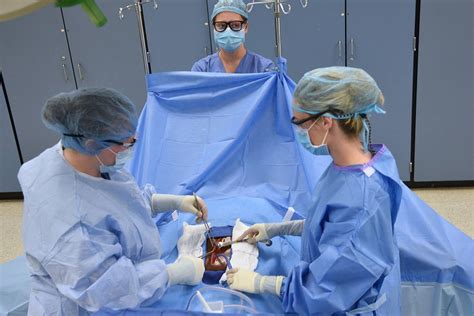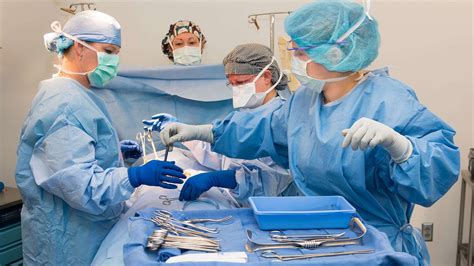Breaking News


Popular News


Discover the top 10 surgical tech programs in the US and learn about accreditation, curriculum, clinical training, job placement, and career services.Are you interested in pursuing a career as a surgical technologist? If so, you’ve come to the right place. In this blog post, we’ll be exploring the top 10 surgical tech programs in the US. From understanding what surgical tech programs entail to the importance of accreditation, curriculum and specializations, clinical training opportunities, job placement, and career services, we’ve got you covered. Choosing the right program can be a daunting task, but with the right information at your fingertips, the process becomes much more manageable. Whether you’re a high school graduate looking to enter the healthcare field or a working professional seeking a career change, finding the right surgical tech program is crucial to your success. Join us as we delve into the world of surgical tech education and gain insight into what makes these top programs stand out from the rest.
Contents

Surgical Tech Programs are educational programs designed to train individuals in the field of surgical technology. These programs typically include a combination of classroom instruction and hands-on clinical training to prepare students for a career as a surgical technologist.
Students in these programs learn about anatomy and physiology, medical terminology, surgical procedures, and sterile techniques. They also receive training in operating room protocol, patient care, and surgical equipment handling. Upon completion of the program, graduates are eligible to sit for the national certification exam to become a Certified Surgical Technologist (CST).
Many Surgical Tech Programs are offered at community colleges, technical schools, and universities across the United States. Some programs may also be available online, providing flexibility for working professionals or individuals with other obligations. It’s important to choose a program that is accredited by the Commission on Accreditation of Allied Health Education Programs (CAAHEP) or the Accrediting Bureau of Health Education Schools (ABHES) to ensure the quality of education and eligibility for certification.
Overall, Surgical Tech Programs offer a comprehensive education and training experience for individuals aspiring to work in the operating room. Graduates of these programs play a vital role in assisting surgeons and ensuring the safety and well-being of patients during surgical procedures.

Accreditation is a critical factor to consider when choosing a surgical tech program. Proper accreditation ensures that the program meets the necessary quality standards and provides a high-level education. Accreditation also indicates that the program has been reviewed and approved by an independent accrediting body, giving students and employers confidence in the quality of education and training received.
Attending an accredited surgical tech program is important for the future career prospects of students. Many employers prefer to hire graduates from accredited programs, as it demonstrates that the candidate has received a comprehensive and rigorous education. Additionally, accreditation may be a requirement for becoming certified as a surgical technologist, making it essential for students to choose an accredited program.
Moreover, accreditation can impact a student’s ability to transfer credits to another institution or pursue further education. Without proper accreditation, students may find it challenging to continue their education or receive recognition of their achievements. Therefore, choosing an accredited surgical tech program is crucial for long-term career success and advancement in the field.

When considering a surgical tech program, it’s important to take a close look at the curriculum and specializations offered. These will play a crucial role in shaping your education and preparing you for your future career as a surgical technologist.
Many programs will cover a wide range of topics, including anatomy and physiology, medical terminology, surgical procedures, and sterile processing. Some programs may also offer specializations in areas such as robotic surgery, orthopedics, or neurosurgery, allowing students to focus on specific areas of interest.
It’s important to choose a program that offers a comprehensive curriculum and a variety of specializations to ensure that you receive a well-rounded education that prepares you for the diverse responsibilities of a surgical technologist.
By selecting a program with a strong curriculum and diverse specializations, you can ensure that you are well-prepared to excel in your future career as a surgical technologist.

One of the most important aspects of a surgical tech program is the opportunity for clinical training. These hands-on experiences allow students to apply their knowledge in a real-world setting, working alongside experienced professionals in a surgical environment. Clinical training not only reinforces classroom learning but also provides students with the practical skills and confidence they need to succeed in their future careers.
Many top surgical tech programs in the US offer clinical rotations at prestigious medical institutions, giving students exposure to a wide range of surgical procedures and specialized areas of practice. These opportunities allow students to work with different surgical teams, learn from various healthcare professionals, and gain invaluable experience in diverse clinical settings.
Additionally, some programs may provide externship or internship opportunities that allow students to further immerse themselves in the clinical environment. These placements can be crucial for building professional connections, gaining specialized skills, and enhancing job prospects after graduation. The hands-on experience gained through clinical training opportunities is often highly valued by employers in the healthcare industry.
Furthermore, students can benefit from mentorship and guidance from seasoned surgical technologists during their clinical training, receiving personalized feedback and support as they develop their skills. This direct interaction with experienced professionals can be an invaluable part of a student’s educational journey, providing unique insights and practical knowledge that can’t be obtained in a traditional classroom setting.

One important aspect to consider when choosing a surgical tech program is the job placement and career services offered by the school. It’s essential to find a program that has a strong track record of helping students secure employment after completion of the program. Look for programs that offer assistance with resume writing, interview preparation, and job search strategies.
Another factor to consider is the networking opportunities provided by the program. A strong network can often lead to job opportunities. Find out if the program has partnerships with local hospitals, surgical centers, and other healthcare facilities. These partnerships can be valuable in helping students secure job placements after graduation.
Additionally, it’s important to research the post-graduation employment rate of the program. This will give you an idea of the program’s success in placing graduates in entry-level positions in surgical technology. Programs with high employment rates may indicate a strong focus on preparing students for the workforce.
Lastly, consider the career services offered by the program. Some schools offer ongoing support to alumni, including access to job postings, career counseling, and professional development opportunities. These services can be invaluable as you navigate your career in surgical technology.

What are the top surgical tech programs in the US?
Some of the top surgical tech programs in the US include the programs at Stanford University, University of California – San Francisco, and Texas Tech University.
What factors should I consider when choosing a surgical tech program?
When choosing a surgical tech program, consider factors such as accreditation, clinical experience opportunities, job placement rates, and the program’s reputation in the field.
How long does it take to complete a surgical tech program?
Surgical tech programs typically take 9 months to 2 years to complete, depending on whether you pursue a certificate, associate’s degree, or bachelor’s degree.
What are the job prospects for surgical tech graduates?
Job prospects for surgical tech graduates are excellent, with a projected job growth rate of 9% from 2020 to 2030, according to the Bureau of Labor Statistics.
Are there any specific requirements for admission to surgical tech programs?
Admission requirements vary by program, but generally include a high school diploma or equivalent, prerequisite courses in science and math, and possibly a background check and immunizations.
How much can I expect to earn as a surgical tech?
The median annual wage for surgical technologists was $49,710 in May 2020, with the highest 10 percent earning more than $71,400.
What is the typical curriculum for a surgical tech program?
Typical curriculum includes courses in anatomy and physiology, medical terminology, surgical procedures, sterile techniques, and clinical rotations in surgical settings.